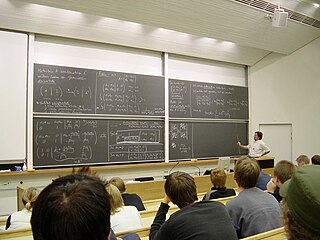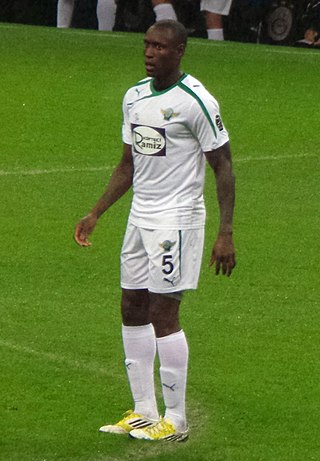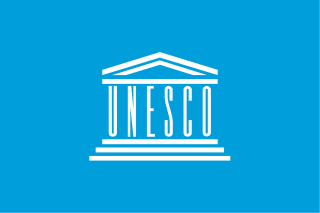Andre Sonko (born 4 February 1944 [1] in Ngazobil) is a politician in Senegal.
Sonko was the Senegalese Minister for Education, and presided over the 1998 UNESCO World Conference for Higher Education. [2]
Andre Sonko (born 4 February 1944 [1] in Ngazobil) is a politician in Senegal.
Sonko was the Senegalese Minister for Education, and presided over the 1998 UNESCO World Conference for Higher Education. [2]

Higher education is tertiary education leading to the award of an academic degree. Higher education, which makes up a component of post-secondary, third-level, or tertiary education, is an optional final stage of formal learning that occurs after completion of secondary education. It represents levels 5, 6, 7, and 8 of the 2011 version of the International Standard Classification of Education structure. Tertiary education at a nondegree level is sometimes referred to as further education or continuing education as distinct from higher education.
Secondary education or post-primary education covers two phases on the International Standard Classification of Education scale. Level 2 or lower secondary education is considered the second and final phase of basic education, and level 3 upper secondary education or senior secondary education is the stage before tertiary education. Every country aims to provide basic education, but the systems and terminology remain unique to them. Secondary education typically takes place after six years of primary education and is followed by higher education, vocational education or employment. In most countries secondary education is compulsory, at least until the age of 16. Children typically enter the lower secondary phase around age 12. Compulsory education sometimes extends to age 20.

Tertiary education, also referred to as third-level, third-stage or post-secondary education, is the educational level following the completion of secondary education. The World Bank, for example, defines tertiary education as including universities as well as trade schools and colleges. Higher education is taken to include undergraduate and postgraduate education, while vocational education beyond secondary education is known as further education in the United Kingdom, or included under the category of continuing education in the United States.

Adult education, distinct from child education, is a practice in which adults engage in systematic and sustained self-educating activities in order to gain new forms of knowledge, skills, attitudes, or values. It can mean any form of learning adults engage in beyond traditional schooling, encompassing basic literacy to personal fulfillment as a lifelong learner, and to ensure the fulfillment of an individual.

The International Association of Universities (IAU) is a membership-led non-governmental organization working in the field of higher education. It comprises more than 600 higher education institutions and organizations in over 130 countries. IAU is an official partner of UNESCO. The IAU secretariat is based in Paris and is located at the headquarters of UNESCO.

Helge Mølsted Sander is a Danish politician. He is the former Danish Minister of Science, Technology and Development. He is a member of the Liberal Party, and was a member of parliament (Folketinget) from 10 January 1984 to 31 January 1998; and again from 2005.
The Senegalese education system is based on its French equivalent. The state is responsible for the creation of an educational system that enables every citizen access to education. Articles 21 and 22 of the Constitution adopted in January 2001 guarantee access to education for all children. However, due to limited resources and low demand for secular education in areas where Islamic education is more prevalent, the law is not fully enforced.

Peter Plympton Smith is an American educator and politician who served as a member of the United States House of Representatives from the U.S. state of Vermont, the 76th lieutenant governor of Vermont, and an education administrator. He served as the founding president of the Community College of Vermont, the founding president of California State University, Monterey Bay, and as assistant director general for education of the United Nations Educational, Scientific, and Cultural Organization (UNESCO).

Ibrahima Sonko is a Senegalese former professional footballer who played as a centre back.
Education in the State of Palestine refers to the educational system in the Gaza Strip and the West Bank, which is administered by the Palestinian Ministry of Education and Higher Education. Enrollment rates amongst Palestinians are relatively high by regional and global standards. According to a youth survey in 2003, 60% between the ages 10–24 indicated that education was their first priority. Youth literacy rate is 98.2%, while the national literacy rate is 91.1%. Enrollment ratios for higher education were 45% in 2022. In 2016 Hanan Al Hroub was awarded the Varkey Foundation Global Teacher Prize for her work in teaching children how to cope with violence.

A Hispanic-serving institution (HSI) is defined in U.S. federal law as an accredited, degree-granting, public or private nonprofit institution of higher education with 25% or higher total undergraduate Hispanic or Latino full-time equivalent (FTE) student enrollment. In the 2021–22 academic year, 572 institutions met the federal criteria, up from 539 institutions in the 2018–19 academic year.
Education in Kyrgyzstan is compulsory for nine years, between ages seven and 15. Following four years of primary and five years of lower secondary school, the system offers two years of upper secondary school, specialized secondary school, or vocational/technical school.
University World News (UWN) is an online publisher that reports on higher education news and developments from a global perspective.

The United Nations Educational, Scientific and Cultural Organization (UNESCO) is a specialized agency of the United Nations (UN) with the aim of promoting world peace and security through international cooperation in education, arts, sciences and culture. It has 194 member states and 12 associate members, as well as partners in the non-governmental, intergovernmental and private sector. Headquartered in Paris, France, UNESCO has 53 regional field offices and 199 national commissions.
Mbuvi Gideon Kioko, popularly known as Mike Sonko or simply Sonko, is a controversial Kenyan politician. He served as the second Governor of Nairobi. He was removed from the office of the governor by a form of impeachment by the Senate of the Republic of Kenya on Abuse of Office, Gross Misconduct and Crimes under National Law on 17 December 2020.
The World Declaration on Higher Education for the Twenty-First Century: Vision and Action was adopted by UNESCO's World Conference on Higher Education on 9 October 1998, with the aim of setting global standards on the ideals and accessibility of higher education.
Patience Sonko-Godwin is a Gambian historian.
Education in Cyprus is overseen by the Ministry of Education, Sports and Youth.
Chitra Jayant Naik (1918–2010) was an Indian educationist, writer, social worker, the chairperson of the Indian Institute of Education and the expert member of the Planning Commission of India. She was the chairperson of the Non-formal Education Committee set up by the Ministry of Human Resource Development and was a member of the National Literacy Mission. The Government of India awarded her the fourth highest Indian civilian honour of Padma Shri in 1986.

Climate change education (CCE) is education that aims to address and develop effective responses to climate change. It helps learners understand the causes and consequences of climate change, prepares them to live with the impacts of climate change and empowers learners to take appropriate actions to adopt more sustainable lifestyles. Climate change and climate change education are global challenges that can be anchored in the curriculum in order to provide local learning and widen up mindset shits on how climate change can be mitigated. In such as case CCE is more than climate change literacy but understanding ways of dealing with climate